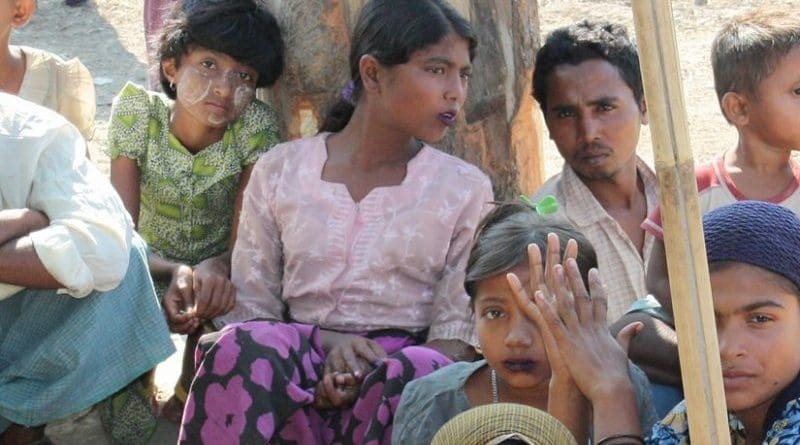Bangladesh Minister: Rohingya Who Fled Myanmar Pose Security Threat
By RFA
A Bangladeshi minister last Thursday warned of potential security threats as the country grapples with crimes brought about by the influx of thousands of Rohingya refugees.
Foreign Minister A.H. Mammood Ali said in a report to parliament that there were up to 400,000 undocumented refugees from Myanmar living in Cox’s Bazar and four neighboring districts in southeastern Bangladesh.
“They have been involved in drug peddling, smuggling of illegal arms, human trafficking and other anti-social activities along the Bangladesh-Myanmar border,” Ali said. “In the future, this huge Muslim community from Rakhine state may pose threats to our national security.”
Ali’s statement came as a Jakarta-based think-tank reported that a new armed Rohingya insurgency was operating along the Bangladeshi-Myanmar border. BenarNews, an RFA-affiliated online news service, obtained the minister’s written statement to parliament.
First called the Harekat al-Yakin, the insurgent group changed its name in March 2017 to the Arakan Rohingya Salvation Army (ARSA), according to the Institute for Policy Analysis of Conflict (IPAC).
In a report released in May, IPAC said the group’s existence became known when hundreds of men attacked three police posts along the Myanmar-Bangladesh border, killing nine Myanmar border guards in October 2016. The attacks led to security sweeps in the Myanmar state of Rakhine, which caused around 75,000 Rohingya residents to flee into Cox’s Bazar during the following months, according to the United Nations.
“The existence of an armed group on the border mounting attacks on Myanmar security forces could inspire pro-ISIS groups in Bangladesh,” the IPAC report said, using another acronym for the militant group Islamic State (IS).
Ties between extremists in Bangladesh and Southeast Asian countries are growing because of IS’s presence in the region, as well as population movements by students, migrant workers and refugees, the report said.
Replying to a question from Irafil Alam, a ruling-party parliament member, Ali said that up to 400,000 Rohingya had snuck into Bangladesh to flee decades-long persecution launched by the Myanmar security forces, starting in 1978. He said the refugees constituted 20 percent to 25 percent of Cox’s Bazar district, which has a population of more than 1.6 million.
Ali’s number closely matched the figures presented to the U.N. in April by Nurul Islam, Bangladesh’s minister for expatriate welfare and oversees affairs, who said 403,000 Rohingya had settled in the country.
Israfil Alam, a member of parliament for the ruling Awami League, asked Ali what damage the Rohingya were causing in Bangladesh.
“The infiltrating Myanmar nationals have been causing huge social, economic, political and environmental damages in Bangladesh,” Ali said, explaining that the Rohingya had been establishing settlements all over, damaging land, cutting trees and harming the environment.
“They developed a crime syndicate in the bordering areas (Bangladesh and Myanmar),” he said. “Besides, they have been causing law-and-order situation through different criminal activities.”
Chess ‘pawns’
The minister’s report about the Rohingya involvement in criminal activities was true, said Mizanur Rahman, former National Human Rights Commission chairman.
“But actually they are the pawns of the chess board. The masterminds of the trans-boundary crime syndicate utilize the Rohingya from behind the scene,” he told BenarNews.
“As the Rohingya are stateless, they are hapless. So, they are easily available people to do any types of bad works. They do it for their survival,” Rahman said.
Newly arrived Rohingya refugees have reported witnessing cases of killings, rapes and acts of arson carried out by Myanmar security forces against their people – allegations that Myanmar’s government has denied.
The United Nations in May appointed a fact-finding mission to probe allegations in the Buddhist majority Rakhine state, but Myanmar’s de facto leader, Aung San Suu Kyi, rejected the U.N. mission.
Reported by BenarNews, an RFA-affiliated online news service.


Mizanur Rahman former National Human Rights Commission chairman was quoted as saying “But actually they are the pawns of the chess board. The masterminds of the trans-boundary crime syndicate utilize…. ” He may actually be on to something that relates to world geopolitics if you consider the following:
In the 19th century the British Empire organised the mass migration of Bengali Muslims to Burma to work plantations in the predominantly Buddhist Rakhine State. The purpose of the migration was to create an artificial ruling class that would depend on the protection of the British Empire. The result was more than a century of tension with the indigenous Buddhist inhabitants and the Muslim settlers, a tension that has led to the ethnic cleansing of today, whereby Takfiri fanatics, financed by Pakistan and Saudi Arabia are committing genocide through muslim Bangladesh against local Buddhist peasants with the full complicity of UN, ‘human rights’ organizations and noble laureates, NGOs (George Soros) and the mass media as part of a US geostrategic initiative to “kossovise” the Rakhine State by separating it from Myanmar, thereby securing a foothold for Western neo-colonial interests in the highly strategic Bay of Bengal. The so-called ‘Rohingya crisis’ attests to a new phase in imperialist policy; namely, the ruthless weaponization of the refugee….
The real victim here are the small indigenous Rakhine ethnic people from Myanmar (of about 3 million) who remain voiceless and unheard from but who have been clinging to their Buddhist religion for over 2,500 years (the only people on earth who can claim that to be Buddhists since the time of Buddha) against the continuous onslaught of jihadi terror for centuries, while other predominately Buddhist and Hindu countries in south east Asia like present day Pakistan, Bangladesh, Malaysia, Indonesia, etc.. have succumbed to islamization around the 12th century.